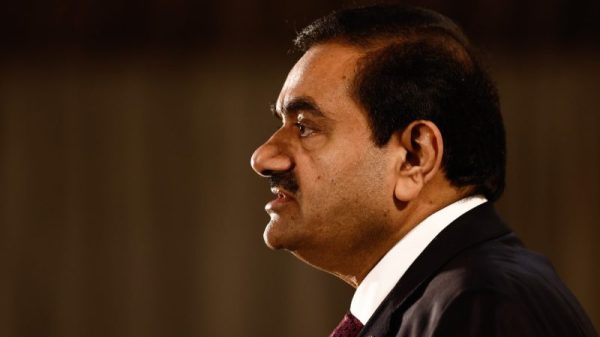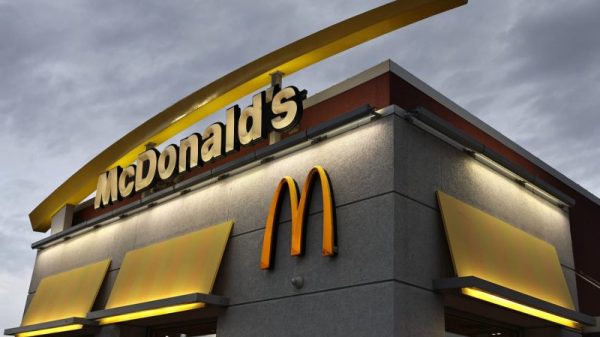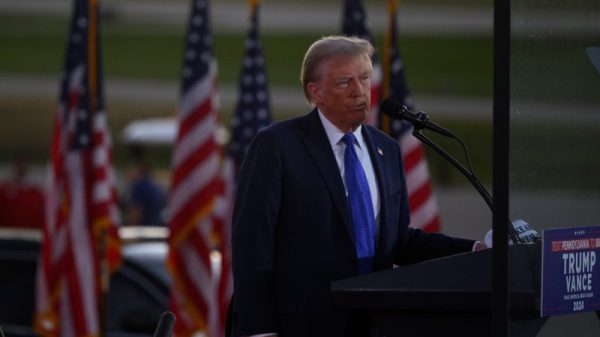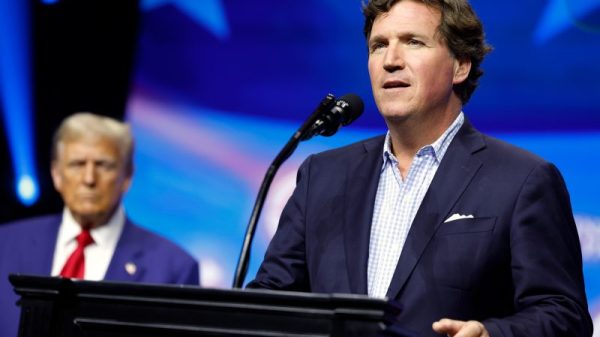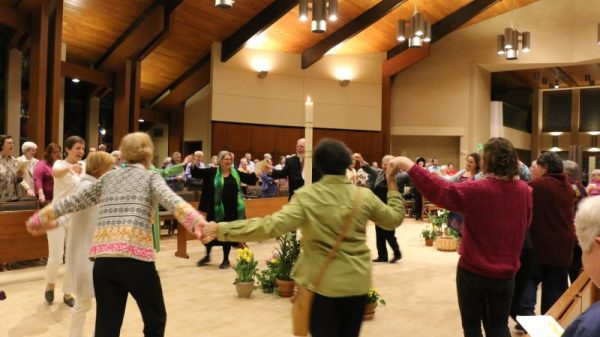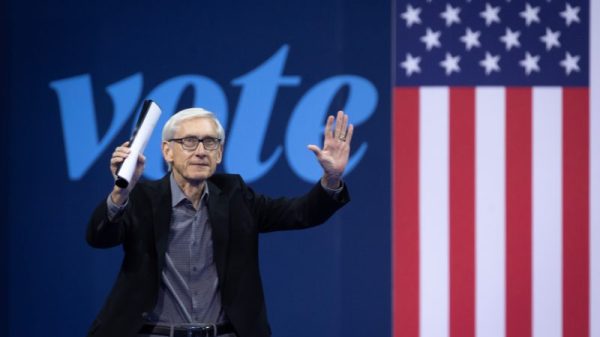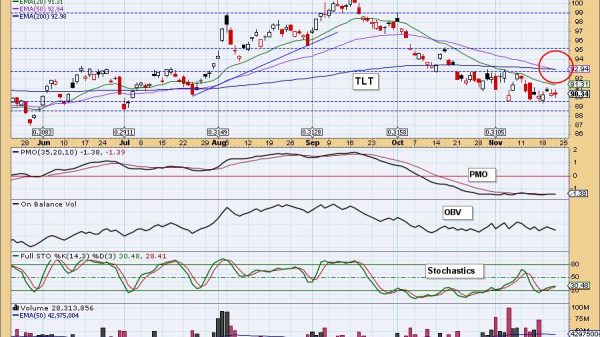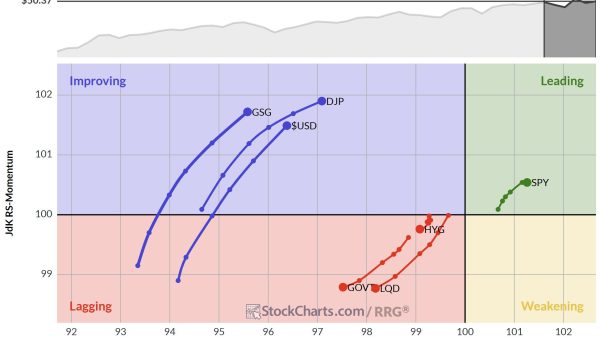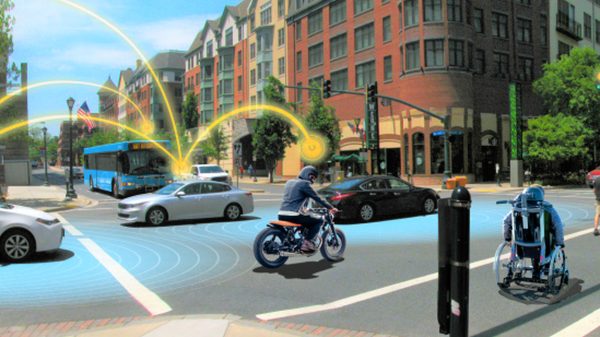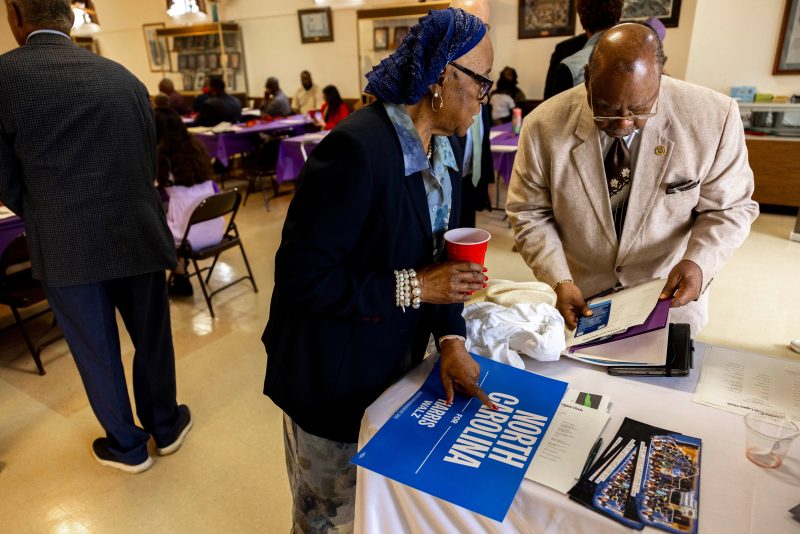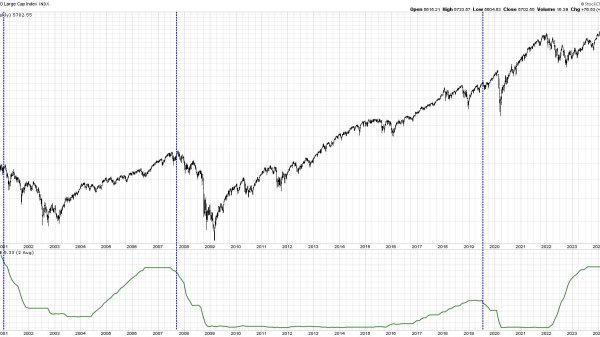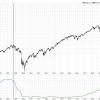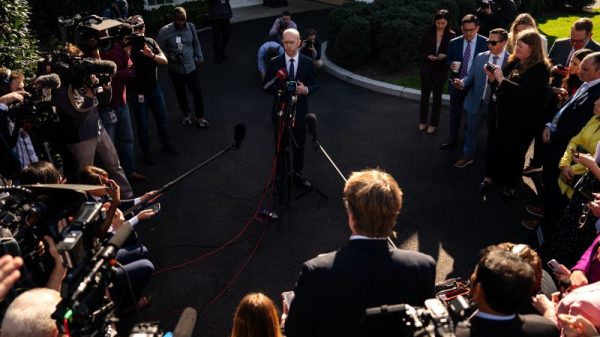
CHARLOTTE — Lawrence Call Jr. didn’t want to vote for Donald Trump again. “As a human being I can’t stand him,” the 57-year-old told a Democratic door-knocker at his front porch. And President Joe Biden was too old, as he saw it. But now Call had another option: Vice President Kamala Harris.
“She’s got a newer outlook,” said Call, who is a registered Republican but votes “independently,” after taking a pro-Harris flier last week. Leaning toward voting for Harris, he agreed to bring it to a meeting with fellow veterans.
“We’ll be back around,” vowed Aiden Graham, the Democratic organizer, as he left for the next house on Call’s cul-de-sac.
Harris has raised Democratic hopes of winning North Carolina, a populous battleground that has been just beyond their grasp since Barack Obama briefly turned it blue in 2008. The elusive prize represents the party’s best chance of winning a state Biden couldn’t in 2020, and the race here is a dead heat eight weeks before Election Day, according to nonpartisan analysts and strategists from both parties. Harris, who is back in the state Thursday, has energized voters in a way Biden could not, Democratic organizers said, forcing Republicans to expend significant resources here.
The stakes for Trump are especially high: His likeliest paths to the presidency rest on holding North Carolina and its 16 electoral votes. (Only seven states offer more.) Republicans have nominated polarizing candidates up and down the ballot, especially GOP gubernatorial pick Mark Robinson, whose offensive comments keep drawing scrutiny. Trump visited the state on Friday for his fourth campaign visit since Harris replaced Biden at the top of the Democratic ticket.
But many Democrats, stung by years of almost-but-not-quite victories, still see themselves as underdogs in a state Biden lost by just over one point in 2020. Republicans have dominated in federal races in recent years even as Democrats held the governor’s mansion; Democrats haven’t won a Senate race since 2008 and disappointing presidential outcomes have become the norm since Obama’s victory that year ended a Republican winning streak dating back to 1980.
Democrats have long believed the state’s rapidly growing population and demographics — including a significant number of Black voters and millennial voters — put it firmly in play. Yet roughly 40 percent of the state lives in rural areas, which tend to be conservative strongholds that have helped the GOP stay on top.
Trump is polling better here than he did at this point in either 2016 or 2020, when he ultimately won, and his allies said they see support for his rival leveling off. While Harris is emphasizing abortion rights in a state where the procedure is banned after 12 weeks of pregnancy, both Republican and Democratic strategists said economic issues are more salient in this Bible Belt state.
North Carolina GOP chair Jason Simmons said his party always expected North Carolina to be close and that polling shows the economy is voters’ top issue, while security at the U.S.-Mexico border also ranks highly. “Those are the issues that are going to drive voters to Donald Trump,” he said.
Democrats have increased the pressure on Republicans by booking about $50 million in advertising in the state. Trump’s main super PAC has not made reservations for most of September and October, but Republicans have roughly matched their opponents in ad spending through this weekend, according to AdImpact. Meanwhile, Democrats have sought to capitalize on fresh energy for Harris. Recruiting less politically engaged union members to organize used to feel like “pulling teeth” with Biden at the top of the ticket, Graham said. No longer.
The ground war is in high gear: As Graham and his colleagues recently knocked doors for Democrats with the hospitality workers union Unite Here Local 23, they took note of the pro-Trump mailers stuffed into mailboxes along their route and ran into a young pro-Harris canvasser from another group.
Unite Here canvasser Tekeria Colvin, 26, pulled out her phone to play a brief recording of her visit with a group of Trump-supporting men she stumbled across while trying to speak with one of their girlfriends.
“Trump is top G — that’s who we need in the chair,” a man said, using a slang term for someone who commands respect that is associated with the self-described misogynist influencer Andrew Tate. The man wasn’t sure of Harris’s first name. (Trump has constantly mispronounced it.)
The campaigns are also battling over unaffiliated voters that make up more than one-third of registered voters in North Carolina — more than either Democrats or Republicans. Many are prone to changing their minds.
Democrats look beyond urban centers
In some ways, North Carolina resembles other states that have shifted in Democrats’ direction, such as Georgia, said Amy Walter, editor in chief of the nonpartisan Cook Political Report, which last month moved North Carolina from “leans Republican” to “toss-up.” It has a Black population of more than 20 percent and lots of out-of-state transplants. But there are key differences.
“It is a more small town, rural state than Georgia is,” Walter said. Cities quickly give way to red territory. Harris needs to “post better numbers in the suburbs right outside of Charlotte or right outside of the research triangle, and that’s the challenge,” Walter said.
Democrats are not only banking on high turnout in large cities including Charlotte, noting the Harris campaign has 26 field offices around the state, including in deep-red counties. On Saturday, Democratic National Committee Chair Jaime Harrison was in Robeson County — which favored Trump by about 19 points in 2020 — to address a small gathering of church and community leaders at the local African American Cultural Center.
Harrison told the mostly Black crowd that if North Carolina went blue, Harris would be their next president. “We remember how he treated the first Black president,” he said of Trump, alluding to the former president’s years-long false claims that Obama was not born in the United States. Speaker after speaker invoked former first lady Michelle Obama’s charge to “do something.”
By the time megachurch pastor James Gailliard brought things to a close, people were on their feet, shouting their agreement.
“No disrespect to my folk in Durham, Charlotte — but we’re not going to trust y’all to get us over the finish line,” Gailliard said. They would need to juice turnout everywhere.
Outside Charlotte, in Gaston County, which voted for Trump by nearly 28 points in 2020, a Harris campaign office has attracted voters like Gary Boggess, a registered Republican in his 60s who can’t stand Trump and dropped by the Democratic outpost late last month interested in helping. “We put a sign in our yard — he just cannot win,” Boggess told a reporter who ran into him later.
In a sign of North Carolina’s importance to Harris, the vice president chose to unveil her first major policy speech in Raleigh just before the Democratic National Convention.
The speech and its policy proposals were aimed squarely at some of the central issues in the state, according to a Harris campaign official, who like some others spoke on the condition of anonymity to discuss internal planning. Harris detailed economic proposals aimed at boosting the middle class, holding “corporate landlords” accountable for rent hikes and putting homeownership within reach of more Americans.
“Together we will build what I call an opportunity economy,” Harris said. “Everyone, regardless of who they are or where they start, has an opportunity to build wealth for themselves and their children.”
Trump and allies still see an edge
When Trump’s team has laid out their paths to 270 electoral votes, they have said they might only need to flip two states, Georgia and Pennsylvania — as long as they keep North Carolina. They could replace North Carolina with wins elsewhere, but the math gets tougher.
GOP operatives acknowledged that Harris has solidified the Democratic base that threatened to revolt against Biden. But Trump officials said they believe Harris’s support is now leveling off after a peak.
“President Trump’s position in North Carolina is stronger today than it has ever been since 2016,” said Trump campaign spokeswoman Karoline Leavitt in a statement, predicting Harris “will lose ever more support as more and more North Carolinians understand just how dangerously liberal she is.”
In a major victory for Trump, a North Carolina court recently granted independent candidate Robert F. Kennedy Jr.’s last-minute request to have his name removed from ballots, delaying absentee ballots that were supposed to start mailing out last Friday. RFK Jr. endorsed Trump as Republicans worried that he would pull more voters from their side than from Democrats.
While Trump has often bashed mail voting, he recently released a TikTok encouraging North Carolinians to take advantage of absentee ballots.
“I still think that the wind is at Trump’s back in North Carolina,” said Paul Shumaker, a longtime GOP strategist in the state who predicted Harris would struggle to overcome voter concerns about immigration and the economy. Shumaker voiced confidence about Trump’s standing with the state’s “unaffiliated” voters, many of whom he calls “Ping-Pong” voters because they often change their minds.
Trump returned to North Carolina on Friday for a police union event where he reprised his disparaging nickname for Harris — “Comrade Kamala” — and portrayed her as too far left. He spoke in his usual, apocalyptic terms, rejecting federal statistics that show a decrease in murders.
“Kamala Harris and the Communist left have unleashed a brutal plague of bloodshed, crime, chaos, misery and death upon our land,” Trump said.
Some Republicans in North Carolina have grown nervous about downballot candidates such as Robinson, who fires up the base but has alienated many other voters. In a statement, Harris campaign spokeswoman Dory MacMillan said the vice president’s “positive vision for the future” contrasts with that of “Trump and his MAGA allies like Mark Robinson.”
Yet Republicans say they see little evidence in the polls that Robinson is dragging Trump down and believe many voters will split their tickets — as they often do in North Carolina.
Marianne Levine in Washington contributed to this report.

